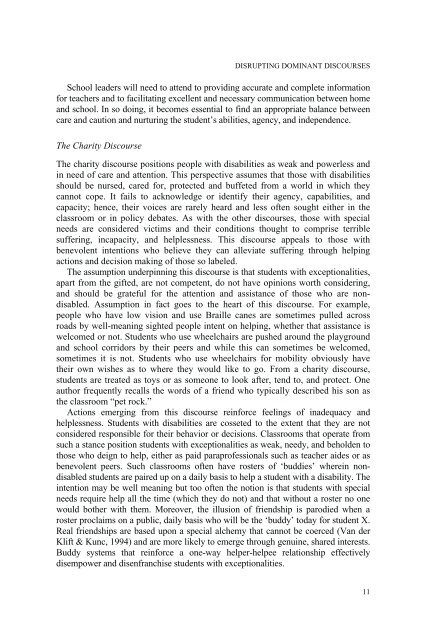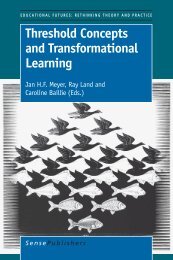Leadership for Inclusion
577-leadership-for-inclusion
577-leadership-for-inclusion
- No tags were found...
Create successful ePaper yourself
Turn your PDF publications into a flip-book with our unique Google optimized e-Paper software.
DISRUPTING DOMINANT DISCOURSES<br />
School leaders will need to attend to providing accurate and complete in<strong>for</strong>mation<br />
<strong>for</strong> teachers and to facilitating excellent and necessary communication between home<br />
and school. In so doing, it becomes essential to find an appropriate balance between<br />
care and caution and nurturing the student’s abilities, agency, and independence.<br />
The Charity Discourse<br />
The charity discourse positions people with disabilities as weak and powerless and<br />
in need of care and attention. This perspective assumes that those with disabilities<br />
should be nursed, cared <strong>for</strong>, protected and buffeted from a world in which they<br />
cannot cope. It fails to acknowledge or identify their agency, capabilities, and<br />
capacity; hence, their voices are rarely heard and less often sought either in the<br />
classroom or in policy debates. As with the other discourses, those with special<br />
needs are considered victims and their conditions thought to comprise terrible<br />
suffering, incapacity, and helplessness. This discourse appeals to those with<br />
benevolent intentions who believe they can alleviate suffering through helping<br />
actions and decision making of those so labeled.<br />
The assumption underpinning this discourse is that students with exceptionalities,<br />
apart from the gifted, are not competent, do not have opinions worth considering,<br />
and should be grateful <strong>for</strong> the attention and assistance of those who are nondisabled.<br />
Assumption in fact goes to the heart of this discourse. For example,<br />
people who have low vision and use Braille canes are sometimes pulled across<br />
roads by well-meaning sighted people intent on helping, whether that assistance is<br />
welcomed or not. Students who use wheelchairs are pushed around the playground<br />
and school corridors by their peers and while this can sometimes be welcomed,<br />
sometimes it is not. Students who use wheelchairs <strong>for</strong> mobility obviously have<br />
their own wishes as to where they would like to go. From a charity discourse,<br />
students are treated as toys or as someone to look after, tend to, and protect. One<br />
author frequently recalls the words of a friend who typically described his son as<br />
the classroom “pet rock.”<br />
Actions emerging from this discourse rein<strong>for</strong>ce feelings of inadequacy and<br />
helplessness. Students with disabilities are cosseted to the extent that they are not<br />
considered responsible <strong>for</strong> their behavior or decisions. Classrooms that operate from<br />
such a stance position students with exceptionalities as weak, needy, and beholden to<br />
those who deign to help, either as paid paraprofessionals such as teacher aides or as<br />
benevolent peers. Such classrooms often have rosters of ‘buddies’ wherein nondisabled<br />
students are paired up on a daily basis to help a student with a disability. The<br />
intention may be well meaning but too often the notion is that students with special<br />
needs require help all the time (which they do not) and that without a roster no one<br />
would bother with them. Moreover, the illusion of friendship is parodied when a<br />
roster proclaims on a public, daily basis who will be the ‘buddy’ today <strong>for</strong> student X.<br />
Real friendships are based upon a special alchemy that cannot be coerced (Van der<br />
Klift & Kunc, 1994) and are more likely to emerge through genuine, shared interests.<br />
Buddy systems that rein<strong>for</strong>ce a one-way helper-helpee relationship effectively<br />
disempower and disenfranchise students with exceptionalities.<br />
11




